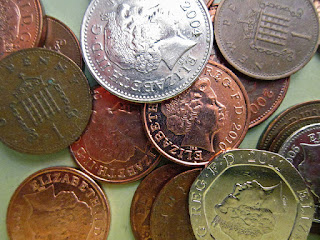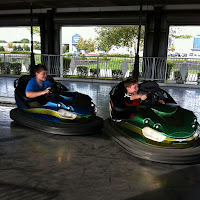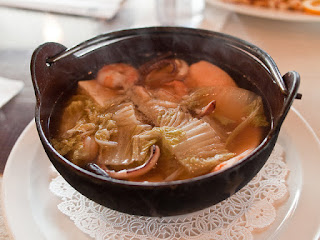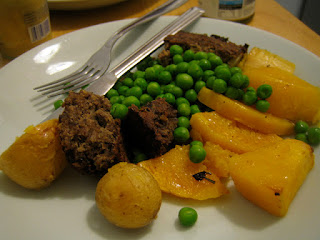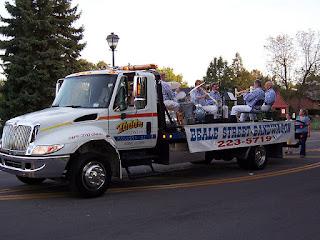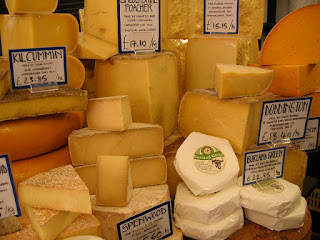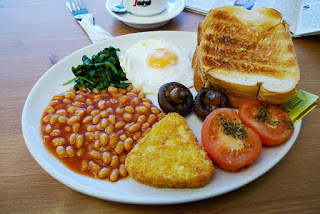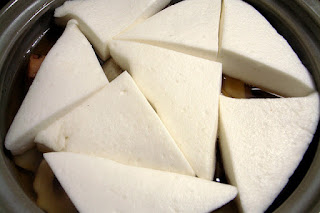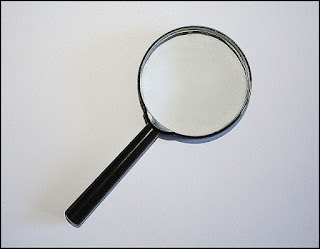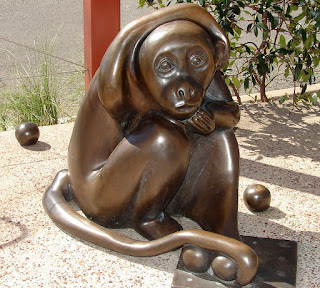Someone who is left with less money than they should have or expected to have, or who loses money, might be described as “out of pocket.”
This phrase apparently dates from the 1600s [1].
Examples of use:
“Care workers forced to cut short home visits or be left out of pocket”
“A summer festival may be cancelled indefinitely after it left the city council almost £500,000 out of pocket, it has emerged.”
“She is currently out of pocket by almost £2,000 and police say it is unlikely that the cash will be recovered.”
Out-of-pocket expenses are generally paid for in cash rather than being included in a budget and are often reimbursed.
e.g. “Customers of O2 will be able to claim for any out-of-pocket expenses that resulted from being without their phone, according to consumer expert Helen Dewdney.”
[1] “out of pocket” In The American Heritage Dictionary of Idioms, by Christine Ammer. 2nd ed. Houghton Mifflin, 2013.
Photo credit: Petras Gagilas
I blog about editing, proofreading, and the English language.
Comments and suggestions are welcome.
Many of the phrasal verbs and idioms addressed in this blog were highlighted during an English conversation class I ran a few years ago. I’m grateful to those who attended this for helping me see my native language from a different perspective.
Most of the examples used are quotes from news articles. Click on the links (in yellow) to view the full article.
Wednesday, 30 January 2019
A FISH OUT OF WATER
You might describe yourself as “a fish out of water” if you feel that you are in an inappropriate or uncomfortable environment or situation.
Like “piping hot,” this phrase is credited to Geoffrey Chaucer, who wrote that “A monk when he is reckless [fails to do his duty] is like a fish that is waterless” [1].
Examples of use:
“He felt like ‘a fish out of water’ there, he said, so he moved back to his place in London in 2013.”
“I suppose what I’m saying is that, even if you get off to the shakiest start, and feel like a fish out of water, things can change so much for the better.”
“Neither speaks, both have been persecuted; they are misunderstood fish out of water suffering at the hands of an arrogant, unsympathetic society that only respects ‘winners’ who reflect its own hard-bitten, narrow-minded values.”
Like “piping hot,” this phrase is credited to Geoffrey Chaucer, who wrote that “A monk when he is reckless [fails to do his duty] is like a fish that is waterless” [1].
Examples of use:
“He felt like ‘a fish out of water’ there, he said, so he moved back to his place in London in 2013.”
“I suppose what I’m saying is that, even if you get off to the shakiest start, and feel like a fish out of water, things can change so much for the better.”
“Neither speaks, both have been persecuted; they are misunderstood fish out of water suffering at the hands of an arrogant, unsympathetic society that only respects ‘winners’ who reflect its own hard-bitten, narrow-minded values.”
[1] Cresswell, Julia. “fish” in The Oxford Dictionary of Word Origins. Oxford University Press, 2009.
Photo credit: Stan Lupo
Tuesday, 29 January 2019
JUMP THE GUN
If you jump the gun, you act before the appropriate time.
This phrase reflects an athlete starting a race a fraction of a second before the starting gun fires [1].
Examples of use:
“Council denies it has ‘jumped the gun’ on road consultation”
“But men frequently jump the gun by asking for their partner’s hand in marriage after around two years and four months together.”
“I’ve spoken to Bristol City and I’m quietly confident on the talks we’ve had. I’ll never jump the gun,’ but it seems positive at the moment.”
[1] Cresswell, Julia. “jump” in The Oxford Dictionary of Word Origins. Oxford University Press, 2009.
Photo credit: Jon Marshall
This phrase reflects an athlete starting a race a fraction of a second before the starting gun fires [1].
“Council denies it has ‘jumped the gun’ on road consultation”
“But men frequently jump the gun by asking for their partner’s hand in marriage after around two years and four months together.”
“I’ve spoken to Bristol City and I’m quietly confident on the talks we’ve had. I’ll never jump the gun,’ but it seems positive at the moment.”
[1] Cresswell, Julia. “jump” in The Oxford Dictionary of Word Origins. Oxford University Press, 2009.
Photo credit: Jon Marshall
Monday, 28 January 2019
BUMPING INTO PEOPLE
When my eldest son arrived home tonight, he said he’d bumped into his pal on the train home.
Although people do sometimes physically collide with each other, he really meant that he’d met his friend unexpectedly.
The phrase “bumped into” is frequently used to describe a chance meeting, usually with someone we know.
Examples of use:
“Now, he’s donated hundreds of pounds worth of the plastic playbricks to Laxfield Primary School in Suffolk after a teaching assistant bumped into him in a local pub.”
“In 1987, I was in Perth, Western Australia, and bumped into Hughie in Fremantle.”
“Inside the store, several elderly people bump into each other.”
Photo credit: Don Rogers
Although people do sometimes physically collide with each other, he really meant that he’d met his friend unexpectedly.
The phrase “bumped into” is frequently used to describe a chance meeting, usually with someone we know.
Examples of use:
“Now, he’s donated hundreds of pounds worth of the plastic playbricks to Laxfield Primary School in Suffolk after a teaching assistant bumped into him in a local pub.”
“In 1987, I was in Perth, Western Australia, and bumped into Hughie in Fremantle.”
“Inside the store, several elderly people bump into each other.”
Photo credit: Don Rogers
Sunday, 27 January 2019
WHY DO WE SAY THAT SOMETHING IS PIPING HOT?
We use the term “piping” hot to describe extremely hot food or liquid, but where does “piping” come from?
According to the Oxford Dictionary of English Idioms, piping describes the hissing or sizzling noise made by very hot food taken from an oven. The earliest recorded use of the phrase was in The Miller’s Tale by Geoffrey Chaucer: “And wafres, pipyng hoot out of the gleede” (And cakes, piping hot out of the fire) [1]. (You can find a free copy of this at Project Gutenberg.)
Examples of use:
“And of course, nothing says a Burns Night supper party menu like mounds of piping hot haggis and tatties - it’s what Rabbie would have wanted.”
“With clean hands, crush the tofu between your fingers into the pan (or mash it in with a potato masher) and cook for a few minutes more, until it’s piping hot and well mixed with the other ingredients.”
“When it arrived, the lasagne was piping hot with the perfect amount of cheese, four pasta layers, smoky bacon and mince, and it tasted delicious.”
[1] “piping” in Oxford Dictionary of English Idioms, edited by Ayto, John. Oxford University Press, 2009.
Photo credit: Edsel Little
According to the Oxford Dictionary of English Idioms, piping describes the hissing or sizzling noise made by very hot food taken from an oven. The earliest recorded use of the phrase was in The Miller’s Tale by Geoffrey Chaucer: “And wafres, pipyng hoot out of the gleede” (And cakes, piping hot out of the fire) [1]. (You can find a free copy of this at Project Gutenberg.)
Examples of use:
“And of course, nothing says a Burns Night supper party menu like mounds of piping hot haggis and tatties - it’s what Rabbie would have wanted.”
“With clean hands, crush the tofu between your fingers into the pan (or mash it in with a potato masher) and cook for a few minutes more, until it’s piping hot and well mixed with the other ingredients.”
“When it arrived, the lasagne was piping hot with the perfect amount of cheese, four pasta layers, smoky bacon and mince, and it tasted delicious.”
[1] “piping” in Oxford Dictionary of English Idioms, edited by Ayto, John. Oxford University Press, 2009.
Photo credit: Edsel Little
Saturday, 26 January 2019
SELLING LIKE HOT CAKES
Something that sells (or goes) like hot cakes is sold quickly in large quantities.
Examples of use:
“Tickets for the White Rose Award Finalist, Yorkshire Dales Food & Drink Festival are on sale and are selling like hot cakes!”
“It has just been announced that the show will be extending its run until March next year, but tickets are bound to go like hot cakes.”
“Tickets from Paris to Saint Pierre have sold like hot cakes - much to experts’ surprise.”
This term originated in the mid-1800s. It apparently refers to hot cakes, known as drop scones in England and pancakes in Scotland, which are popular at church sales, food fairs, and similar events and tend to sell rapidly. [1]
[1] “like hot cakes, go” in The American Heritage Dictionary of Idioms, by Christine Ammer. 2nd ed. Houghton Mifflin, 2013.
Photo credit: Dale Simonson
“Tickets for the White Rose Award Finalist, Yorkshire Dales Food & Drink Festival are on sale and are selling like hot cakes!”
“It has just been announced that the show will be extending its run until March next year, but tickets are bound to go like hot cakes.”
“Tickets from Paris to Saint Pierre have sold like hot cakes - much to experts’ surprise.”
This term originated in the mid-1800s. It apparently refers to hot cakes, known as drop scones in England and pancakes in Scotland, which are popular at church sales, food fairs, and similar events and tend to sell rapidly. [1]
[1] “like hot cakes, go” in The American Heritage Dictionary of Idioms, by Christine Ammer. 2nd ed. Houghton Mifflin, 2013.
Photo credit: Dale Simonson
Friday, 25 January 2019
EYES BIGGER THAN BELLY/STOMACH
If your eyes are bigger than your belly/stomach, you have requested or taken more food than you can eat.
Examples of use:
“We also had tortilla (£4.90), patatas bravas (£4.50) and fries (£2.50), all of which were good but to be honest, our eyes were bigger than our stomachs, so we probably over-ordered.”
“I was also ‘spoilt’ by my granny who always had cookies and sweets for me when I went to see her – so it was a case of my eyes being bigger than my belly – until that got bigger too.”
It is also sometimes used to describe someone committing to more than they can manage:
“Then all of a sudden, just like me when I refuse to choose between cheesecake, chocolate mouse and key lime pie, his eyes became bigger than his belly and the metaphorical souffle went flaccid.”
This expression is believed to date from the late 1500s [1].
[1] “eyes are bigger than one’s stomach, one’s” in The American Heritage Dictionary of Idioms, by Christine Ammer. 2nd ed. Houghton Mifflin, 2013.
Photo credit: Gordon Joly
Examples of use:
“We also had tortilla (£4.90), patatas bravas (£4.50) and fries (£2.50), all of which were good but to be honest, our eyes were bigger than our stomachs, so we probably over-ordered.”
“I was also ‘spoilt’ by my granny who always had cookies and sweets for me when I went to see her – so it was a case of my eyes being bigger than my belly – until that got bigger too.”
It is also sometimes used to describe someone committing to more than they can manage:
“Then all of a sudden, just like me when I refuse to choose between cheesecake, chocolate mouse and key lime pie, his eyes became bigger than his belly and the metaphorical souffle went flaccid.”
This expression is believed to date from the late 1500s [1].
[1] “eyes are bigger than one’s stomach, one’s” in The American Heritage Dictionary of Idioms, by Christine Ammer. 2nd ed. Houghton Mifflin, 2013.
Photo credit: Gordon Joly
Thursday, 24 January 2019
JUMP ON THE BANDWAGON
If you jump on the bandwagon, you support a popular cause.
(The literal meaning of “bandwagon” is a truck for carrying a band in a parade.)
Examples of use:
“With the new year in full swing, you may’ve noticed a lot of people jumping on the bandwagon of detox drinks, but do they really work?”
“‘If more speculators jump on the bandwagon (because of the U.S. government shutdown), gold will pass the $1,300 level,’ Briesemann said.”
“Travellers began flagging up badly behaved people refusing to move out of seats belonging to other people, and social media users jumped on the bandwagon sharing videos that they had seen of bad behaviour leading to nationwide shaming.”
The current use of this phrase apparently originated in America in the late 19th century [1].
[1] Cresswell, Julia. “band” in The Oxford Dictionary of Word Origins. Oxford University Press, 2009.
Photo credit: Kate Antoniades
(The literal meaning of “bandwagon” is a truck for carrying a band in a parade.)
“With the new year in full swing, you may’ve noticed a lot of people jumping on the bandwagon of detox drinks, but do they really work?”
“‘If more speculators jump on the bandwagon (because of the U.S. government shutdown), gold will pass the $1,300 level,’ Briesemann said.”
“Travellers began flagging up badly behaved people refusing to move out of seats belonging to other people, and social media users jumped on the bandwagon sharing videos that they had seen of bad behaviour leading to nationwide shaming.”
The current use of this phrase apparently originated in America in the late 19th century [1].
[1] Cresswell, Julia. “band” in The Oxford Dictionary of Word Origins. Oxford University Press, 2009.
Photo credit: Kate Antoniades
Wednesday, 23 January 2019
ON ITS LAST LEGS
The phrase “on its/one’s last legs” indicates that something/someone is worn out or exhausted.
Examples of use:
“But as he stretched his vocal chords over the final note of 50 Ways To Leave Your Lover, and the spine-tingling accordion intro of The Boy In The Bubble cranked into gear, it became clear this wasn’t a performer on his last legs but one still at the peak of his powers.”
“I might be on my last legs on day seven but if I look alright maybe they might think I can handle a Grand Tour.”
“The boiler is on its last legs, we have crumbling bricks in the cellar, flooring that needs replacing and the school building hasn’t been painted for 30 years.”
Photo credit: James Niland
 |
| On its last (six) legs? |
Examples of use:
“But as he stretched his vocal chords over the final note of 50 Ways To Leave Your Lover, and the spine-tingling accordion intro of The Boy In The Bubble cranked into gear, it became clear this wasn’t a performer on his last legs but one still at the peak of his powers.”
“I might be on my last legs on day seven but if I look alright maybe they might think I can handle a Grand Tour.”
“The boiler is on its last legs, we have crumbling bricks in the cellar, flooring that needs replacing and the school building hasn’t been painted for 30 years.”
Photo credit: James Niland
Tuesday, 22 January 2019
GOOSEBERRIES AND THIRD WHEELS
A third person in the company of two others (often lovers) who would prefer to be alone is often referred to as either a gooseberry or a third wheel. Interestingly, “third wheel” isn’t featured in the main dictionaries, but it is in regular use and I'm reliably informed by my teenage sons that it’s considered cooler than “gooseberry” and has replaced it as far as the younger generation is concerned.
Examples of use:
“The most convincing romantic chemistry is between Clary and Charlie Stemp as Prince Harry of Hampstead, leaving Snow White a gooseberry in the show that bears her name.”
“It’s more that he popped up like a third wheel, disrupting Lucy and Martin’s perfect presenting dynamic.”
The term “third wheel” may originate from “fifth wheel”, which is defined as a superfluous person or thing. The term “gooseberry” apparently originates from “gooseberry-picker” as an activity that was used as a pretext (excuse) for lovers to be together [1].
[1] “gooseberry” in The Oxford Dictionary of Phrase and Fable, edited by Knowles, Elizabeth. Oxford University Press, 2005.
Photo credit: Katrina Parks
Examples of use:
“The most convincing romantic chemistry is between Clary and Charlie Stemp as Prince Harry of Hampstead, leaving Snow White a gooseberry in the show that bears her name.”
“It’s more that he popped up like a third wheel, disrupting Lucy and Martin’s perfect presenting dynamic.”
The term “third wheel” may originate from “fifth wheel”, which is defined as a superfluous person or thing. The term “gooseberry” apparently originates from “gooseberry-picker” as an activity that was used as a pretext (excuse) for lovers to be together [1].
[1] “gooseberry” in The Oxford Dictionary of Phrase and Fable, edited by Knowles, Elizabeth. Oxford University Press, 2005.
Photo credit: Katrina Parks
Monday, 21 January 2019
SHOW UP and SHOW SOMEONE UP
If someone shows up, they arrive for an event or appointment.
e.g. “Around 2,000 people showed up to watch the Scot struggle against the world number one.”
(In this context, the phrasal verb “to show up” has no object.)
However, to show someone (including yourself) up involves embarrassing them (or you) and/or exposing faults.
e.g. “Sothern was jailed on Friday for four years at Liverpool Crown Court where revelations of his criminal past showed him up as a serial conman.”
e.g. “Mr Missentzis said he and Mr Christensen wanted to get some revenge on the Australians, who showed them up at the Perth Motorplex at the weekend.”
(In this context, the phrasal verb “to show up” does have an object.)
Photo credit: Alasdair Massie
e.g. “Around 2,000 people showed up to watch the Scot struggle against the world number one.”
(In this context, the phrasal verb “to show up” has no object.)
However, to show someone (including yourself) up involves embarrassing them (or you) and/or exposing faults.
e.g. “Sothern was jailed on Friday for four years at Liverpool Crown Court where revelations of his criminal past showed him up as a serial conman.”
e.g. “Mr Missentzis said he and Mr Christensen wanted to get some revenge on the Australians, who showed them up at the Perth Motorplex at the weekend.”
(In this context, the phrasal verb “to show up” does have an object.)
Photo credit: Alasdair Massie
Sunday, 20 January 2019
SIT ON THE FENCE
If you sit on the fence, you avoid making a decision or committing to a particular viewpoint.
Examples of use:
“The easiest thing for academic economists to do is sit on the fence”
“Unless it wished to antagonise a large slice of its audience, it had little choice but to sit on the fence.”
“What they don’t do is sit on the fence waiting until they are 100% sure they can’t mess up.”
In this phrase, the two sides of the fence represent opposing viewpoints or choices [1].
[1] “fence” in The Oxford Dictionary of Phrase and Fable, edited by Knowles, Elizabeth. Oxford University Press, 2005.
Photo credit: Kenneth Barker (Creative Commons)
Examples of use:
“The easiest thing for academic economists to do is sit on the fence”
“Unless it wished to antagonise a large slice of its audience, it had little choice but to sit on the fence.”
“What they don’t do is sit on the fence waiting until they are 100% sure they can’t mess up.”
In this phrase, the two sides of the fence represent opposing viewpoints or choices [1].
[1] “fence” in The Oxford Dictionary of Phrase and Fable, edited by Knowles, Elizabeth. Oxford University Press, 2005.
Photo credit: Kenneth Barker (Creative Commons)
Saturday, 19 January 2019
EASILY CONFUSED WORDS – PORTION/POTION
Although “potion” and “portion” differ by only one letter, their meanings are completely different.
Depending on your interests, it’s much more likely that “portion” is the word you need, especially for academic writing.
A portion is a part of a whole or a share of something.
e.g. “The BBC understands that the three firms chosen are likely to retain a portion of their award even if their services are no longer needed, due to a deal being reached with Brussels.”
It is also used to describe an amount of food suitable for or to be served to one person.
e.g. “On average, muffins bought on-the-go at railway station food outlets had 19% more sugar per portion and were 32% bigger than those bought in supermarkets.”
Harry Potter readers should be familiar with “potion” – this is a drink that is poisonous or has healing or magical properties.
e.g. “She was a beautiful young woman married to a famous archer, Hou-yi, who managed to win an immortality potion.”
The following use of “potion” is incorrect - this should be replaced with “portion”.
“Ms. Stallmach says that only a small potion of their annual income comes from government funding, with last year’s being less than 12 per cent.” ❌
 |
| Portions of potions? |
Depending on your interests, it’s much more likely that “portion” is the word you need, especially for academic writing.
A portion is a part of a whole or a share of something.
e.g. “The BBC understands that the three firms chosen are likely to retain a portion of their award even if their services are no longer needed, due to a deal being reached with Brussels.”
It is also used to describe an amount of food suitable for or to be served to one person.
e.g. “On average, muffins bought on-the-go at railway station food outlets had 19% more sugar per portion and were 32% bigger than those bought in supermarkets.”
Harry Potter readers should be familiar with “potion” – this is a drink that is poisonous or has healing or magical properties.
e.g. “She was a beautiful young woman married to a famous archer, Hou-yi, who managed to win an immortality potion.”
The following use of “potion” is incorrect - this should be replaced with “portion”.
“Ms. Stallmach says that only a small potion of their annual income comes from government funding, with last year’s being less than 12 per cent.” ❌
Photo credit: Chris Potako
Friday, 18 January 2019
CHEESED OFF
Someone who is cheesed off is annoyed or disappointed.
Examples of use:
“A German lawyer is cheesed off after receiving more than 100 unwanted pizzas delivered to his office - and now police are investigating the mystery.” 😊
“In Eastbourne last week, Cibulkova declared herself seriously cheesed off by the prospect of being demoted from this favoured group.”
According to Ammer, this term dates back to the mid-1900s; it was originally military slang and was sometimes shortened to “cheesed” [1]. Sadly, no further information on the origins of this phrase appears to be available.
[1] “cheesed off” In The American Heritage Dictionary of Idioms, by Christine Ammer. 2nd ed. Houghton Mifflin, 2013.
Photo credit: Simon Willison
“A German lawyer is cheesed off after receiving more than 100 unwanted pizzas delivered to his office - and now police are investigating the mystery.” 😊
“In Eastbourne last week, Cibulkova declared herself seriously cheesed off by the prospect of being demoted from this favoured group.”
According to Ammer, this term dates back to the mid-1900s; it was originally military slang and was sometimes shortened to “cheesed” [1]. Sadly, no further information on the origins of this phrase appears to be available.
[1] “cheesed off” In The American Heritage Dictionary of Idioms, by Christine Ammer. 2nd ed. Houghton Mifflin, 2013.
Photo credit: Simon Willison
Thursday, 17 January 2019
THE WRONG END OF THE STICK
If someone gets (hold of) the wrong end of the stick, they misunderstand something.
Examples of use:
“‘There's no real argument against it,’ says Catherine Utley, 59. ‘People are getting the wrong end of the stick.’”
“Maybe they got the wrong end of the stick when somebody suggested they should buy a Little Trees air freshener for the car.”
The original meaning of this phrase appears to have been to fare worse, with the current meaning evolving during the 1800s [1]. According to Ammer [2], this expression refers to a walking stick, which is useless if held upside down.
However, Jack claims that the phrase dates back to Roman times and the use of communal toilets where people sat side by side. The Romans apparently used a short staff with a sponge tied to one end for personal hygiene and had to take care not to get hold of the wrong end when reaching out to use it [3]. This practice is supported by Britten in an article with this phrase in its title, although he does not comment specifically on the origins of the idiom [4].
[1] Cresswell, Julia. “wrong” In The Oxford Dictionary of Word Origins. Oxford University Press, 2009.
[2] “wrong end of the stick, the” In The American Heritage Dictionary of Idioms, by Christine Ammer. 2nd ed. Houghton Mifflin, 2013.
[3] Jack, Albert. Red Herrings & White Elephants: The Origins of the Phrases We Use Every Day (pp. 238–239). Kindle Edition.
[4] Britten, M. (2014),'Don't Get the Wrong End of the Stick: Lifting the Lid on Roman Toilet Behaviour', Reinvention: an International Journal of Undergraduate Research, Volume 7, Issue 1, http://www.warwick.ac.uk/reinventionjournal/issues/volume7issue1/britten Date accessed [17/01/19].
Photo credit: Andy Wallace
“‘There's no real argument against it,’ says Catherine Utley, 59. ‘People are getting the wrong end of the stick.’”
“Maybe they got the wrong end of the stick when somebody suggested they should buy a Little Trees air freshener for the car.”
The original meaning of this phrase appears to have been to fare worse, with the current meaning evolving during the 1800s [1]. According to Ammer [2], this expression refers to a walking stick, which is useless if held upside down.
However, Jack claims that the phrase dates back to Roman times and the use of communal toilets where people sat side by side. The Romans apparently used a short staff with a sponge tied to one end for personal hygiene and had to take care not to get hold of the wrong end when reaching out to use it [3]. This practice is supported by Britten in an article with this phrase in its title, although he does not comment specifically on the origins of the idiom [4].
[1] Cresswell, Julia. “wrong” In The Oxford Dictionary of Word Origins. Oxford University Press, 2009.
[2] “wrong end of the stick, the” In The American Heritage Dictionary of Idioms, by Christine Ammer. 2nd ed. Houghton Mifflin, 2013.
[3] Jack, Albert. Red Herrings & White Elephants: The Origins of the Phrases We Use Every Day (pp. 238–239). Kindle Edition.
[4] Britten, M. (2014),'Don't Get the Wrong End of the Stick: Lifting the Lid on Roman Toilet Behaviour', Reinvention: an International Journal of Undergraduate Research, Volume 7, Issue 1, http://www.warwick.ac.uk/reinventionjournal/issues/volume7issue1/britten Date accessed [17/01/19].
Photo credit: Andy Wallace
Wednesday, 16 January 2019
FLAVOUR OF THE MONTH
A person or thing that is “flavour of the month” has a short period of popularity.
This term apparently originated from a marketing trick in US ice-cream parlours during the 1940s, when a particular ice-cream flavour would be promoted for a month or week [1].
Example of use:
“While he may still have many of his millions, it’s fair to say from the closure of his restaurants and opposition to his tax plans that he’s no longer flavour of the month.”
“‘Prosecco seems to be the flavour of the month,’ Terry Monichino from Monichino’s in Katunga said.”
[1] “flavour of the month” in The Oxford Dictionary of Phrase and Fable, edited by Knowles, Elizabeth. Oxford University Press, 2005.
Photo credit: Marit & Toomas Hinnosaar
This term apparently originated from a marketing trick in US ice-cream parlours during the 1940s, when a particular ice-cream flavour would be promoted for a month or week [1].
“While he may still have many of his millions, it’s fair to say from the closure of his restaurants and opposition to his tax plans that he’s no longer flavour of the month.”
“‘Prosecco seems to be the flavour of the month,’ Terry Monichino from Monichino’s in Katunga said.”
[1] “flavour of the month” in The Oxford Dictionary of Phrase and Fable, edited by Knowles, Elizabeth. Oxford University Press, 2005.
Photo credit: Marit & Toomas Hinnosaar
Tuesday, 15 January 2019
BITING HANDS
If someone offers you a good deal, you might bite their hand off, but you shouldn’t bite the hand that feeds you.
If you bite someone’s hand off, you eagerly accept what they are offering. This is reminiscent of an animal being so eager to snatch food out of someone’s hand that they accidentally bite their hand off.
e.g. “After taking time off work to look after her stepdad and help her mum get back on her feet following his death, Katherine had Fridays free so decided to help at the hospital. ‘They nearly bit my hand off,’ she says.”
To bite the hand that feeds you, however, is to hurt or be ungrateful to someone who has been kind to you.
This expression apparently dates from the late 18th century and was first recorded in Edmund Burke’s Thoughts on the Cause of the Present Discontents (1770) [1]. (You can find a copy of this here, although it’s not really a page-turner. 😉)
e.g. “To make sustained criticism of class while employed at these institutions is to bite the hand that feeds you.”
[1] “bite” in The Oxford Dictionary of Phrase and Fable, edited by Knowles, Elizabeth. Oxford University Press, 2005.
Photo credit: Matt Miller
e.g. “After taking time off work to look after her stepdad and help her mum get back on her feet following his death, Katherine had Fridays free so decided to help at the hospital. ‘They nearly bit my hand off,’ she says.”
To bite the hand that feeds you, however, is to hurt or be ungrateful to someone who has been kind to you.
This expression apparently dates from the late 18th century and was first recorded in Edmund Burke’s Thoughts on the Cause of the Present Discontents (1770) [1]. (You can find a copy of this here, although it’s not really a page-turner. 😉)
e.g. “To make sustained criticism of class while employed at these institutions is to bite the hand that feeds you.”
[1] “bite” in The Oxford Dictionary of Phrase and Fable, edited by Knowles, Elizabeth. Oxford University Press, 2005.
Photo credit: Matt Miller
Monday, 14 January 2019
MICROSOFT TEXT-TO-SPEECH
ADVANTAGES
- I can use this feature silently with headphones, so I don’t annoy those around me.
- There’s less chance of people doubting my sanity as it doesn’t involve talking to myself. 😉
- Humans often see what they expect to see and may overlook errors when reading aloud (such as consecutive articles, e.g. “the the”). Text-to-speech avoids this problem.
DISADVANTAGES
- I have had issues with the response to “play” and and have often had to click on this two or three times.*
- Pronunciation is often incorrect. (Its interpretation of chemical formulae can be interesting!)
- There is a choice of voices (sometimes); however, the voice occasionally changes so that it sounds like several people speaking together, which is difficult to listen to. This can usually be resolved by stopping and restarting playback.
I’d love to hear about other people’s experience with this function.
BITE THE BULLET
If you bite the bullet, you decide to do something difficult or unpleasant that you have been avoiding.
e.g. “You never know if trains are running or if you have to bite the bullet and get an Uber.”
“The time had come to bite the bullet and replace the roof, but the water has been coming in for so long it has rotted the beams across the church.”
It is suggested that this phrase dates from pre-anaesthetic days, when wounded soldiers were given a bullet or similar solid object to bite on when undergoing surgery [1].
An alternative explanation is linked to the Indian Mutiny (first war of independence, 1857–58), where gun cartridges came in two sections, the missile section being inserted into the base and held in place by grease consisting of beef or pork fat. To charge the bullets, the two sections had to be bitten apart and the base filled with gunpowder. This task was usually performed by low-ranking Hindu soldiers, to whom pigs were holy. In battle, they were forced, against their wishes, to “bite the bullet” [2].
[1] “bite” in Oxford Dictionary of English Idioms, edited by Ayto, John. Oxford University Press, 2009.
[2] Jack, Albert. Red Herrings & White Elephants: The Origins of the Phrases We Use Every Day (pp. 22–23). Kindle Edition.
“The time had come to bite the bullet and replace the roof, but the water has been coming in for so long it has rotted the beams across the church.”
It is suggested that this phrase dates from pre-anaesthetic days, when wounded soldiers were given a bullet or similar solid object to bite on when undergoing surgery [1].
An alternative explanation is linked to the Indian Mutiny (first war of independence, 1857–58), where gun cartridges came in two sections, the missile section being inserted into the base and held in place by grease consisting of beef or pork fat. To charge the bullets, the two sections had to be bitten apart and the base filled with gunpowder. This task was usually performed by low-ranking Hindu soldiers, to whom pigs were holy. In battle, they were forced, against their wishes, to “bite the bullet” [2].
[1] “bite” in Oxford Dictionary of English Idioms, edited by Ayto, John. Oxford University Press, 2009.
[2] Jack, Albert. Red Herrings & White Elephants: The Origins of the Phrases We Use Every Day (pp. 22–23). Kindle Edition.
Sunday, 13 January 2019
TODAY'S NEW WORD - TORREFACTION
Torrefaction (verb - to torrefy) involves roasting, scorching or drying a substance to remove moisture and impurities.
Examples of use:
“According to Henk Hutting, chairman and co-founder of Futerra Fuels, torrefaction will play a critical role in the future of biomass for energy generation.”
“Here, project partners torrefy pine, oak and beech wood, as well as vineyard prunings and waste from olive oil production.”
Examples of use:
“According to Henk Hutting, chairman and co-founder of Futerra Fuels, torrefaction will play a critical role in the future of biomass for energy generation.”
“Here, project partners torrefy pine, oak and beech wood, as well as vineyard prunings and waste from olive oil production.”
CONFUSING MEALS
For most people in the UK, breakfast is the first meal of the day.
After that, it’s more complicated. Lunch is the midday meal, but some people call this dinner.
However, the evening meal is also called dinner by many people, while others call this tea or supper.
Alternatively, supper might be a light meal or snack eaten just before going to bed, possibly a few hours after the evening meal (dinner or tea).
Brunch is a combination of breakfast and lunch, which is eaten late in the morning. (Brinner, as a combination of breakfast and evening dinner, is currently being investigated as a new word for the Collins English Dictionary. Apparently, this first appeared in an episode of the US TV series, Scrubs.)
Afternoon tea is a small meal eaten in the afternoon, which usually comprises a cup of tea with sandwiches and cake.
High tea (generally regarded as old-fashioned) is eaten late in the afternoon instead of an evening meal.
Photo credit: Ewan Munro (Creative Commons)
However, the evening meal is also called dinner by many people, while others call this tea or supper.
Alternatively, supper might be a light meal or snack eaten just before going to bed, possibly a few hours after the evening meal (dinner or tea).
Brunch is a combination of breakfast and lunch, which is eaten late in the morning. (Brinner, as a combination of breakfast and evening dinner, is currently being investigated as a new word for the Collins English Dictionary. Apparently, this first appeared in an episode of the US TV series, Scrubs.)
Afternoon tea is a small meal eaten in the afternoon, which usually comprises a cup of tea with sandwiches and cake.
High tea (generally regarded as old-fashioned) is eaten late in the afternoon instead of an evening meal.
Photo credit: Ewan Munro (Creative Commons)
Labels:
afternoon tea,
breakfast,
British meals,
brunch,
dinner,
English language,
English language learners,
English phrases,
ESL,
high tea,
learn English,
lunch,
tea
Saturday, 12 January 2019
TODAY'S NEW WORD - HANPEN
I learned this new word while editing today.
Hanpen is a soft fish cake made by forming ground fish flesh and starch into squares or triangles, which are then steamed. It can be eaten as it is or alternatively grilled, poached or deep-fried and dipped in soya sauce [1].
I hope to have the chance to try it one day. 😊
[1] Hanpen (2005). In C. Sinclair, Dictionary of food: international food and cooking terms from A to Z (2nd ed.). London, UK: A&C Black.
Photo credit: yoppy
Hanpen is a soft fish cake made by forming ground fish flesh and starch into squares or triangles, which are then steamed. It can be eaten as it is or alternatively grilled, poached or deep-fried and dipped in soya sauce [1].
I hope to have the chance to try it one day. 😊
[1] Hanpen (2005). In C. Sinclair, Dictionary of food: international food and cooking terms from A to Z (2nd ed.). London, UK: A&C Black.
Photo credit: yoppy
HIGH AND LOW
If you hunt or search high and low for something, you look everywhere.
Examples of use:
“The dog owner launched a desperate Facebook appeal, offered a £400 reward and hunted high and low in search of her much-loved pet.”
“You would have to search high and low to find a prettier market square than the one in Donegal town.”
“Hunting High and Low” was the first album by Norwegian rock trio A-ha, which includes this title track:
Photo credit: Jeffrey Beall
Examples of use:
“The dog owner launched a desperate Facebook appeal, offered a £400 reward and hunted high and low in search of her much-loved pet.”
“You would have to search high and low to find a prettier market square than the one in Donegal town.”
“Hunting High and Low” was the first album by Norwegian rock trio A-ha, which includes this title track:
Photo credit: Jeffrey Beall
Friday, 11 January 2019
CATCH-22
The expression “Catch-22” originates from a novel with this title by Joseph Heller (1961).
This was originally given the title “Catch-18” but it was changed to “Catch-22” just before being published as it was discovered that Leon Uris was about to publish “Mila 18” [1].
A Catch-22 is an impossible situation in which one cannot take one action before taking a second action, but the second action cannot be taken before taking the first.
In the original novel, the main character, Yossarian, is a bomber pilot who wants to be relieved of dangerous combat missions in order to stay alive and tries to claim insanity so that he can be grounded. An Air Force ruling states that a man is insane if he willingly undertakes such missions; however, if Yossarian requests that he is relieved of them, he proves himself to be sane and will be forced to continue.
Examples of use:
“Homeless people are getting stuck in a ‘Catch-22’ situation, where without a postal address they are denied access to public services and kept on the streets, the government has been warned.”
“And herein lies the Catch 22: for women to succeed, they are expected to act more stereotypically masculine but those that do so are perceived badly and suffer negative consequences as a result.”
[1] Catch-22, Joseph Heller, Vintage Classics, 2004
Photo credit: Alfred T. Palmer
This was originally given the title “Catch-18” but it was changed to “Catch-22” just before being published as it was discovered that Leon Uris was about to publish “Mila 18” [1].
A Catch-22 is an impossible situation in which one cannot take one action before taking a second action, but the second action cannot be taken before taking the first.
Examples of use:
“Homeless people are getting stuck in a ‘Catch-22’ situation, where without a postal address they are denied access to public services and kept on the streets, the government has been warned.”
“And herein lies the Catch 22: for women to succeed, they are expected to act more stereotypically masculine but those that do so are perceived badly and suffer negative consequences as a result.”
[1] Catch-22, Joseph Heller, Vintage Classics, 2004
Photo credit: Alfred T. Palmer
Thursday, 10 January 2019
BRASS MONKEYS
A couple of years ago, this idiom, which is used to describe extremely cold weather, featured in the Telegraph as one of 30 of the most bizarre phrases in the English language.
e.g. “It is on a brass monkeys Tuesday morning that my friend and I get the train into West Yorkshire with three things on our mind – shopping, food and drink.”
“Well it was caused by something called a ‘sudden stratospheric warming’ – which might seem surprising, given how brass monkeys it is outside.”
[1] Jack, Albert. Red Herrings & White Elephants: The Origins of the Phrases We Use Every Day (pp. 12–13). Kindle Edition.
[2] “brass” in The Oxford Dictionary of Phrase and Fable, edited by Knowles, Elizabeth. Oxford University Press, 2005.
[3] “Brass Monkey” in Encyclopedia of Popular Music, edited by Larkin, Colin. Oxford University Press, 2006.
Photo credit: David Jefferies
e.g. “It is on a brass monkeys Tuesday morning that my friend and I get the train into West Yorkshire with three things on our mind – shopping, food and drink.”
“Well it was caused by something called a ‘sudden stratospheric warming’ – which might seem surprising, given how brass monkeys it is outside.”
This originates from a longer phrase, “it’s cold enough to freeze the balls off a brass monkey”.
It is claimed that this has a nautical origin.
“The guns on 18th-century men-of-war ships needed gunpowder to fire them, and this was stored in a different part of the ship for safety reasons. Young boys, usually orphans, who were small enough to slip through tight spaces, carried this powder along tiny passages and galleys. Because of their agility the lads became known as ‘powder monkeys’ and by association the brass trays used to hold the cannonballs became known as the brass monkeys. These trays had 16 cannonball-sized indentations that would form the base of a cannonball pyramid. Brass was used because the balls would not stick to or rust on brass as they did with iron, but the drawback was that brass contracts much faster in cold weather than iron. This meant that on severely cold days the indentations holding the lower level of cannonballs would contract, spilling the pyramid over the deck, hence ‘cold enough to freeze the balls off a brass monkey’.” [1]
However, another text casts doubt on this explanation, suggesting that the phrase merely alludes to metal figures becoming brittle in cold weather [2].
According to the Collins English Dictionary, “brass monkeys” is now rarely used and is in the lower 50% of commonly used words, so you might want to avoid it if appearing “cool” is important to you. 😉
Brass Monkey is also the name of a folk band formed in 1981, which combined traditional folk and brass instruments [3].
[1] Jack, Albert. Red Herrings & White Elephants: The Origins of the Phrases We Use Every Day (pp. 12–13). Kindle Edition.
[2] “brass” in The Oxford Dictionary of Phrase and Fable, edited by Knowles, Elizabeth. Oxford University Press, 2005.
[3] “Brass Monkey” in Encyclopedia of Popular Music, edited by Larkin, Colin. Oxford University Press, 2006.
Photo credit: David Jefferies
Wednesday, 9 January 2019
TOO BIG FOR ONE'S BOOTS
Someone who is too big for their boots is unduly self-confident, self-important or conceited.
e.g. “We’ve always had a fondness for the underdog; we don’t like it when people get too big for their boots.”
An alternative version of this phrase is “too big for one’s breeches/britches (trousers).”
e.g. “It’s a risk that the corporate chiefs get too big for their breeches.”
“But one thing that can happen when a restaurant gets too big for its britches is that the quality of the food goes down.”
This idiom apparently dates from the 1800s and refers to someone being so swollen with conceit that their boots or trousers become too tight [1].
The phrase “big-headed” is used in a similar way to describe an arrogant person.
e.g. “In response to those decrying her as big-headed, she decided to start the hashtag #ImmodestWomen.”
[1] “too big for one's britches” in The American Heritage Dictionary of Idioms, by Christine Ammer. 2nd ed. Houghton Mifflin, 2013.
Photo credit: sketsman13
Tuesday, 8 January 2019
THROW IN THE TOWEL
In boxing, the second (assistant) of someone who is losing can admit defeat by throwing a towel (or sponge) into the ring.
e.g. “Nasukawa was floored three times in the space of two minutes, leaving him in tears, and his team had no choice but to throw in the towel.”
This phrase has been extended to other situations where someone admits defeat or discontinues a project.
e.g. “While the determination of Mrs May makes this scenario seem unlikely, it is possible that with continuing criticism from her own party, and perhaps more resignations in the offing, the PM could throw in the towel.”
Monday, 7 January 2019
TARRED WITH THE SAME BRUSH
When some people in a group behave badly, and others wrongly believe that everyone in the group is guilty of this behaviour, we say that the whole group is tarred with the same brush.
e.g. “In addition, many providers that provide outstanding care are tarred with the same brush as the exploitative ones.”
“Drivers who have been wronged by a cyclist tar them all with the same brush, and vice versa.
This expression apparently originates from shepherds using tar to cover their sheeps’ wounds to prevent infection [1].
[1] Cresswell, Julia. “tar” In The Oxford Dictionary of Word Origins. Oxford University Press, 2009.
e.g. “In addition, many providers that provide outstanding care are tarred with the same brush as the exploitative ones.”
“Drivers who have been wronged by a cyclist tar them all with the same brush, and vice versa.
This expression apparently originates from shepherds using tar to cover their sheeps’ wounds to prevent infection [1].
[1] Cresswell, Julia. “tar” In The Oxford Dictionary of Word Origins. Oxford University Press, 2009.
Sunday, 6 January 2019
TRAIN OF THOUGHT
A train of thought is a connected series of thoughts. This use of the word “train” apparently predates its use with railways [1].
The song “Train of Thought” by Norwegian rock trio A-ha was a UK Top 10 hit in 1985 [2].
e.g. “For the last three days, the only thing to interrupt my train of thought was a particularly noisy monkey.”
[1] Cresswell, Julia. “train” In The Oxford Dictionary of Word Origins. Oxford University Press, 2009.
[2] “A-Ha” In Encyclopedia of Popular Music, edited by Larkin, Colin. Oxford University Press, 2006.
Photo credit: Charlie Jackson
The song “Train of Thought” by Norwegian rock trio A-ha was a UK Top 10 hit in 1985 [2].
e.g. “For the last three days, the only thing to interrupt my train of thought was a particularly noisy monkey.”
[1] Cresswell, Julia. “train” In The Oxford Dictionary of Word Origins. Oxford University Press, 2009.
[2] “A-Ha” In Encyclopedia of Popular Music, edited by Larkin, Colin. Oxford University Press, 2006.
Photo credit: Charlie Jackson
Saturday, 5 January 2019
MAKING YOUR MIND UP
Making your mind up involves making a decision about something.
e.g. “In particular, I think there are two different criteria which might help you to make your mind up.”
If you change your mind, you reverse or change your decision.
e.g. “We’re a democracy and I believe it’s OK to change your mind.”
Both phrases feature in the song “Making Your Mind Up” by the British band Bucks Fizz, with which they won the Eurovision Song Contest in 1981 [1].
Both phrases feature in the song “Making Your Mind Up” by the British band Bucks Fizz, with which they won the Eurovision Song Contest in 1981 [1].
[1] “Bucks Fizz” In Encyclopedia of Popular Music, edited by Larkin, Colin, Oxford University Press, 2006.
Friday, 4 January 2019
THE LIVING DAYLIGHTS
The phrase “the living daylights” is about extremes. For example, if someone scares the living daylights out of you, they make you extremely scared.
e.g. “When I ask them what their biggest fear is, they often say they don't like clowns – the adults who scare the living daylights out of people in a nasty way.”
Other examples are:
“Every single game I am on his case that I think he goes in too soft-hearted and today I said to him I would slap the living daylights out of him if I don’t see that aggression and desire.” (A severe, hopefully figurative, slapping is threatened here.)
“Poorly mixing nostalgia and newfangled ‘it's all connected!’ franchise world-building, the stitched-together Spectre will bore the living daylights out of you while threatening to render James Bond a culturally irrelevant relic of the past.” (This review claims that Spectre is an extremely boring film.)
The Living Daylights is also the title of a song by Norwegian band A-ha (one of several of their idiomatic song titles – see THE SWING OF THINGS), which was commissioned in 1987 for the James Bond film with the same title [1].
The phrase appears to originate from the use of “daylight” or “daylights” as a metaphor for eyes, and by extension any vital organ of the body, since the mid 18th century [2].
[1] “A-Ha” In Encyclopedia of Popular Music, edited by Larkin, Colin, Oxford University Press, 2006.
[2] “daylight” In Oxford Dictionary of English Idioms, edited by Ayto, John, Oxford University Press, 2009.
e.g. “When I ask them what their biggest fear is, they often say they don't like clowns – the adults who scare the living daylights out of people in a nasty way.”
Other examples are:
“Every single game I am on his case that I think he goes in too soft-hearted and today I said to him I would slap the living daylights out of him if I don’t see that aggression and desire.” (A severe, hopefully figurative, slapping is threatened here.)
“Poorly mixing nostalgia and newfangled ‘it's all connected!’ franchise world-building, the stitched-together Spectre will bore the living daylights out of you while threatening to render James Bond a culturally irrelevant relic of the past.” (This review claims that Spectre is an extremely boring film.)
The Living Daylights is also the title of a song by Norwegian band A-ha (one of several of their idiomatic song titles – see THE SWING OF THINGS), which was commissioned in 1987 for the James Bond film with the same title [1].
The phrase appears to originate from the use of “daylight” or “daylights” as a metaphor for eyes, and by extension any vital organ of the body, since the mid 18th century [2].
[1] “A-Ha” In Encyclopedia of Popular Music, edited by Larkin, Colin, Oxford University Press, 2006.
[2] “daylight” In Oxford Dictionary of English Idioms, edited by Ayto, John, Oxford University Press, 2009.
Thursday, 3 January 2019
THE SWING OF THINGS
This is the title of a song by Norwegian band A-ha (1986, from the album “Scoundrel Days”), but what does it mean?
The expression dates from the 1800s and means to become active or make progress [1].
e.g. “It appears the Duchess of Sussex is now fully into the swing of things in her royal working life, recently attending a poignant service at Westminster Abbey to mark the Centenary of the Royal Air Force.”
We also talk about getting “back into the swing of things” after a break from our usual routine.
e.g. “There is often this loss of professional self-confidence, so it just takes you a while to get back into the swing of things.”
The origin of this phrase is unclear.
[1] “get into the swing of things.” in The American Heritage Dictionary of Idioms, by Christine Ammer. 2nd ed. Houghton Mifflin, 2013.
e.g. “It appears the Duchess of Sussex is now fully into the swing of things in her royal working life, recently attending a poignant service at Westminster Abbey to mark the Centenary of the Royal Air Force.”
We also talk about getting “back into the swing of things” after a break from our usual routine.
e.g. “There is often this loss of professional self-confidence, so it just takes you a while to get back into the swing of things.”
The origin of this phrase is unclear.
[1] “get into the swing of things.” in The American Heritage Dictionary of Idioms, by Christine Ammer. 2nd ed. Houghton Mifflin, 2013.
Wednesday, 2 January 2019
NONPLUSSED
Someone who is nonplussed is so surprised and/or confused that they are unsure how to react.
The word derives from the Latin non (not) and plus (more) [1].
e.g. “The Canadian professor is only the third female recipient of the physics prize in its 118-year history, but she is nonplussed by the focus on her gender.”
[1] “nonplus” In The Concise Oxford Dictionary of English Etymology, edited by Hoad, T. F., Oxford University Press, 1996.
Photo credit: CollegeDegrees360 (Creative Commons)
The word derives from the Latin non (not) and plus (more) [1].
e.g. “The Canadian professor is only the third female recipient of the physics prize in its 118-year history, but she is nonplussed by the focus on her gender.”
[1] “nonplus” In The Concise Oxford Dictionary of English Etymology, edited by Hoad, T. F., Oxford University Press, 1996.
Tuesday, 1 January 2019
PORT OF CALL
A port of call is a place where a ship or person stops on a journey. While the phrase originally referred to ships stopping at ports (coastal towns), its use is now extended to other stopping points on both physical and virtual journeys.
Examples:
“Given that Amsterdam is the only port of call on this short trip, I would say this is pretty significant.”
“Locals in pubs are the best guides to a town and are usually happy to provide directions to my next port of call.”
“Your next port of call should be the review site, explaining clearly the circumstances and requesting that the post is removed.”
“Given that Amsterdam is the only port of call on this short trip, I would say this is pretty significant.”
“Locals in pubs are the best guides to a town and are usually happy to provide directions to my next port of call.”
“Your next port of call should be the review site, explaining clearly the circumstances and requesting that the post is removed.”
Photo credit: Linda Watson
Subscribe to:
Comments (Atom)
